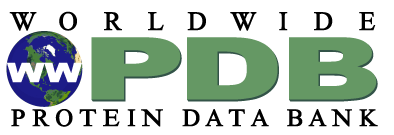Flyers, Posters, & Calendars
 |
PoxvirusesStructures of poxvirus proteins are helping researchers find new ways to combat mpox. |
SARS-CoV-2 Genome and ProteinsThe genome of SARS-CoV-2 is a single strand of RNA encoding a large collection of proteins that are synthesized by the ribosomal machinery after the virus infects a host cell. |
|
 |
Antibiotics in ActionShown are some classes of antibiotics and their target protein/molecule organized by the biochemical pathway they interrupt. |
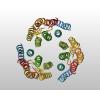 |
Expanding Boundaries of Complexity with 3DEM3D electron microscopy (3DEM) is revolutionizing the field of structural biology. |
 |
ADN: El Acido Desoxirribonucleico (Spanish)Atomic structures reveal how the iconic double helix encodes genomic information |
 |
Molecular Machinery: A Tour of the Protein Data BankThe enormous range of molecular shapes and sizes in the PDB archive is illustrated using 96 structures, depicted relative to the cellular membrane. |
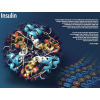 |
Insulin and Dorothy Hodgkin |
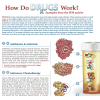 |
How do Drugs Work?PDB structures are used to discuss antibiotics and antivirals, chemotherapy, drug metabolism, drugs of signaling proteins, and lifestyle drugs. |
 |
What is a Protein?Learn about protein structure and function with this overview. |
 |
Virus StructuresLearn about polyhedral, helical, complex, and enveloped viruses with examples drawn at approximately 900,000x magnification. Created in collaboration with EMDataBank. |
 |
The Structures of the Citric Acid CycleAlso known as the Krebs cycle or the tricarboxylic acid cycle, the citric acid cycle is at the center of cellular metabolism. Learn about the structures involved in this metabolic pathway. |
 |
G-Protein Coupled ReceptorsIn honor of the 2012 Nobel Prize in Chemistry. |
 |
Toll-like ReceptorsIn honor of the 2011 Nobel Prize in Physiology or Medicine. |
 |
The RibosomeThis flyer commemorates the 2009 Nobel Prize in Chemistry for studies of the structure and function of the ribosome. |
 |
200 Icosahedral Viruses |
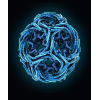 |
Award-winning Clathrin IllustrationMaria Voigt's illustration of Clathrin, created for the Art of Science traveling art exhibit, was recognized by the 2016 Wellcome Trust Image Awards. |
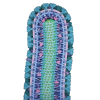 |
Award-winning Ebola IllustrationDavid Goodsell's painting, created for the Molecule of the Month feature on Ebola Virus Proteins, was recognized by the 2016 Wellcome Trust Overall Image Award and the 2015 FASEB BioArt Awards. |
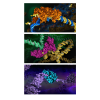 |
Award-winning HIV Enzyme IllustrationVideo stills of three HIV enzymes are among the 2016 Winners of FASEB's BioArt Competition. The stills are from a molecular animation created by Maria Voigt and David Goodsell that illustrates A Molecular View of HIV Therapy. |
 |
Award-winning Illustration of Bacteriophage T4 Infection |
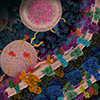 |
Award-winning Illustration of Glutamatergic SynapseMolecular view of glutamatergic synapse by RCSB PDB's Maria Voigt was selected as a national finalist in the 2021 Wiki Science Competition in the United States. |
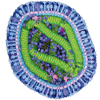 |
Award-winning Measles Virus IllustrationDavid Goodsell's painting, created for the Molecule of the Month feature on Measles Virus Proteins, was recognized by the 2019 FASEB BioArt Awards. |
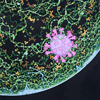 |
Award-winning Respiratory Droplet IllustrationRespiratory droplet with SARS-CoV-2 by RCSB PDB's David S. Goodsell was selected as a national finalist in the 2021 Wiki Science Competition in the United States and the 2021 FASEB BioArt Award. |
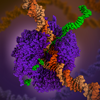 |
Award-winning RNA Polymerase Illustration |
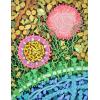 |
Award-winning Zika Virus IllustrationAt the 2017 Vizzies, David Goodsell's painting was recognized by the National Science Foundation (NSF) and Popular Science as one of the best science images of the year and selected as the "People's Choice" in the category of illustration. |
 |
CoronavirusImages of the coronavirus |
 |
Folding of Protein DomainsThis poster highlights common arrangements of secondary structure elements in protein domains as defined using the CATH classification scheme. |
Glucagon-like Peptide-1 and DiabetesImage of GLP-1 receptor recognizing a GLP-1 analog (yellow) with liraglutide. |
|
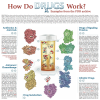 |
How Do Drugs Work?PDB structures are used to discuss antibiotics and antivirals, chemotherapy, drug metabolism, drugs of signaling proteins, and lifestyle drugs. |
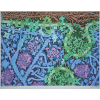 |
Insulin and DiabetesStructural biology has revealed the details of insulin signaling and how this knowledge is being used to create new and better treatments for diabetes. |
 |
Molecular Machinery: A Tour of the Protein Data BankThe enormous range of molecular shapes and sizes in the PDB archive is illustrated using 96 structures, depicted relative to the cellular membrane. |
Shiga Toxin2 in Complex with Ribosomal P-stalkCryo-EM structure of Shiga toxin 2 in complex with the native ribosomal P-stalk reveals residues involved in the binding interaction. |
|
 |
Superbugs! How Bacteria Evolve Resistance to AntibioticsAntibiotics are one of the miracles of modern medicine, allowing us to fight infection by pathogenic bacteria. Antibiotics attack essential molecular machines in bacteria, stopping or slowing their action and ultimately killing the cell. |
 |
The Structural Biology of HIVA painting of the HIV virus surrounded by the atomic structures from the PDB. |
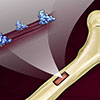 |
2025 Calendar: The Structural Biology of NutritionThe food that we eat contains four major classes of molecules–proteins, nucleic acids, lipids, and carbohydrates–as well as many micronutrients like vitamins and minerals. Our bodies contain thousands of different proteins that interact with and utilize these nutrients to build up our bodies and provide the energy we need to live. |
 |
Molecular Landscapes for 2023The 2023 Calendar Features twelve images from the PDB-101 David Goodsell SciArt gallery. |
2024 Calendar: Peak PerformanceAthletes require bodies that perform best, all the way from molecules to muscles. By understanding the structure and function of biomolecules, athletes can ensure that they are performing at their peak. These include molecules that power and control muscle action, molecules that turn food into energy, essential dietary molecules that are required for health, and molecules that protect our bodies under extreme stress and exertion. This knowledge also informs the ways that all of us can live our best lives, at all stages of our lives. |
|
 |
2022 Calendar: Revolutionizing structural biology with 3DEMThis calendar features twelve molecular assemblies studied by 3DEM. They further our understanding of biology and serve as a gateway to advances in technology and medicine. |
2021 Calendar Celebrating 50 Years of Protein Data Bank2021 Calendar |
|
2020 Calendar: 20 Years of Molecule of the MonthThis calendar celebrates the RCSB PDB Molecule of the Month series that has introduced millions of visitors to the shape and function of the 3D structures archived in the PDB since its launch in January 2000. |
|
2019 Calendar: What is a Protein?Learn about protein structure and function with this 2019 calendar and related materials. |
|
 |
2018 Calendar: Mechanisms of Antimicrobial ResistanceAntibiotics have saved countless lives, but pathogens are quickly finding ways to survive antibiotic treatment. Antibiotic-resistant bacteria are predicted to become the leading cause of death worldwide, with an expected death rate of 10 million people annually by 2050. They take many approaches: pumping antibiotics out of their cells, altering the molecular machinery that the antibiotics target, and attacking the antibiotics directly. Atomic structures publicly available in the PDB are revealing the details of drug resistance and providing new ways to combat it. |
 |
2017 Calendar: Geis Digital ArchiveThis calendar highlights the work of Irving Geis (1908-1997), a gifted artist who helped illuminate the field of structural biology with his iconic images of DNA, hemoglobin, and other important macromolecules. |
 |
2016 A Year in Protein-Drug ComplexesPDB structures allow us to see how drugs bind to their protein targets in exquisite detail. Available as a PDF and PowerPoint. |
 |
2015 Molecule of the Month |
 |
2012 Structural Biology Knowledgebase |
 |
2014 International Year of Crystallography |
 |
2010 Structural Biology Knoweldgebase |
 |
2008 A Year in Structures |


